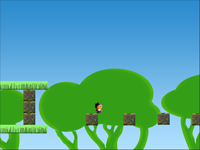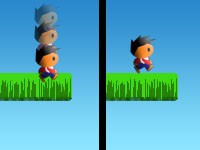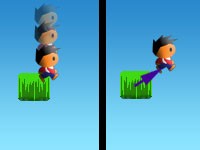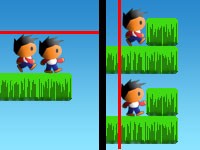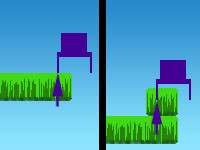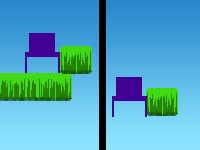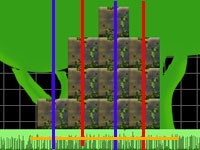Perfect Collision Demo
Update!
For collisions on sides of blocks, use this script:
Actor>Collision>left or right side>block>
int j=yvelocity;
PhysicalResponse(MOVE_EVENT_ACTOR_ONLY, USE_CALCULATED_MASS, 1, 1, 0, 1);
yvelocity=j;
The collision kills all motion then j returns the vertical motion. Its awesome!
Anything is possible. It's 99% there.
There are some rules to how you can draw your levels, between clones and tiles, and there are still a couple of minor glitches, but the player doesn't go thru platforms anymore, and he doesn't get shoved off the edge by a physical response.
You can download the GED file here:
viewtopic.php?f=6&t=5833
Note: You can drag the platforms (cloned ones, not tiled ones) with your mouse, to test arrangements, if you like.
And of course, DST just can't release anything without music!
The posts below explain how its done. Now you might think its too complicated, but ask yourself this: In 1984, when Super Mario Bros. first came out on the NES, do you think it was made by one guy? Do you think that guy was making his first or second game?
No. Mario was made by a highly paid team of computer experts, some of the best of their day, on par with anyone working for NASA or IBM. In comparison, what I'm doing here is very, very simple.
P.S. Don't be scared. This post is long but after i come back from work, i will post the GED file. You can simply build your game off that, if you don't want to learn how it all works.
For collisions on sides of blocks, use this script:
Actor>Collision>left or right side>block>
int j=yvelocity;
PhysicalResponse(MOVE_EVENT_ACTOR_ONLY, USE_CALCULATED_MASS, 1, 1, 0, 1);
yvelocity=j;
The collision kills all motion then j returns the vertical motion. Its awesome!
Anything is possible. It's 99% there.
There are some rules to how you can draw your levels, between clones and tiles, and there are still a couple of minor glitches, but the player doesn't go thru platforms anymore, and he doesn't get shoved off the edge by a physical response.
You can download the GED file here:
viewtopic.php?f=6&t=5833
Note: You can drag the platforms (cloned ones, not tiled ones) with your mouse, to test arrangements, if you like.
And of course, DST just can't release anything without music!
The posts below explain how its done. Now you might think its too complicated, but ask yourself this: In 1984, when Super Mario Bros. first came out on the NES, do you think it was made by one guy? Do you think that guy was making his first or second game?
No. Mario was made by a highly paid team of computer experts, some of the best of their day, on par with anyone working for NASA or IBM. In comparison, what I'm doing here is very, very simple.
P.S. Don't be scared. This post is long but after i come back from work, i will post the GED file. You can simply build your game off that, if you don't want to learn how it all works.
